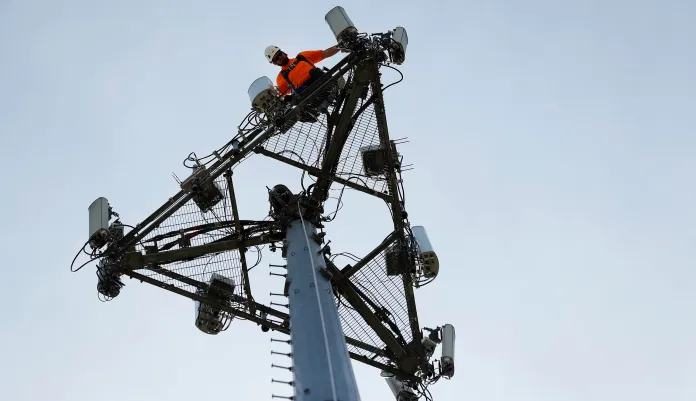EXCLUSIVE — Opposition to land-based infrastructure that could serve as a backup for satellite GPS is being spearheaded by groups linked to Chinese corporations, potentially putting America’s national security at risk, according to a newly released report from the Bull Moose Project.
The Bull Moose Project identified five industry groups representing a large number of Chinese corporations, many with government connections, that are working to kill a proposal before the Federal Communications Commission that would approve the use of terrestrial 5G technology to provide GPS services. Establishing a ground-based alternative to satellite GPS is a pressing national security concern, according to the Bull Moose Project, industry experts, and the Trump administration itself.
“We rely on GPS for so many facets of modern life — from emergency response to military operations to simple driving directions,” FCC Chairman Brendan Carr wrote in March. “While GPS may be indispensable, it is not infallible. Continuing to rely so heavily on one system leaves us exposed. Disruptions to GPS have the potential to undermine the nation’s economic and national security.”
With this in mind, the FCC initiated a Notice of Inquiry in March to explore the development of alternatives to space-based GPS infrastructure.
Standing athwart this effort, as uncovered by the Bull Moose Project, is a collection of trade associations and industry standards development organizations that represent corporations based in China.
Chief among these groups is the Z-Wave Alliance, an organization that has submitted dozens of filings to the FCC opposing the ground-based backup to satellite GPS and which has met with commission staffers to advocate against it.
ZTE Corporation, a Z-Wave Alliance member operating out of Shenzhen, China, for instance, saw the FCC ban its equipment in the United States in 2022 under the Biden administration. In March, Trump’s FCC announced a “sweeping new investigation” into ZTE based on findings that its hardware “pose unacceptable risks to America’s national security.”
Despite bipartisan concern over the threat ZTE posed to national security and the fact that Chinese state-owned corporations appoint the majority of its board members, Z-Wave Alliance has retained the corporation as a member. Z-Wave Alliance counts six other Chinese corporations among its members, according to the Bull Moose Project report.
LoRa Alliance, RAIN Alliance, the Security Industry Association, and the Wi-Sun Alliance, the other four organizations mentioned in the report, collectively represent over three dozen Chinese companies. Notable examples include Huizhong Instrumentation, which has undertaken research for the Chinese government; Shanghai Fudan Microelectronics, a partially state-owned enterprise; Linxens, an electronics firm that was acquired in 2018 by the Chinese state-owned Tsinghua Unigroup; as well as both Inhemeter and Hexing Electrical, which contract with the Chinese government’s state utility company.
A spokeswoman for Security Industry Association told the Washington Examiner that it doesn’t have “any members that are Chinese-owned” and that its opposition to the 5G GPS plan “is driven by our concern, shared by many others, about the impact to devices that are critical to American safety and security.”
Records show that the trade association at one point represented Think-Force and Siterwell Electronics, a pair of Chinese firms that manufacture home security products. As of 2021, one of Siterwell’s employees sat on the Security Industry Association’s standards council.
LoRa Alliance, RAIN Alliance, and the Wi-Sun Alliance did not respond to requests for comment.

“Our country’s near-total reliance on a single, space-based technology has created a dangerous risk,” the Bull Moose Project’s report reads. “If the United States loses access to GPS through jamming, spoofing, or kinetic attack, we are more than just inconvenienced … a successful disruption of GPS could cripple both national defense and the economy in a matter of hours. And yet, there is currently no American terrestrial (also known as ground-based) complement or backup to GPS, despite its adversaries abroad building layered redundancies on both sea and land.”
Indeed, America’s adversaries, such as China, Russia, and Iran, as well as its allies, such as the United Kingdom and South Korea, are all exploring or implementing terrestrial backups for their GPS infrastructure. The Bull Moose Project’s report argues that ground-based 5G towers, which can be used to provide GPS services, are easier to repair than satellites and that individual towers can pick up the slack for another in the event of outages. Additionally, the group points out that leveraging 5G towers to provide backup GPS services would be relatively low-cost, as the nation’s existing infrastructure could be used for the purpose.
Opponents of the current proposal before the FCC, which would grant NextNav approval to use 5G towers for GPS services by allowing the use of the 902-928 MHz radio frequency range, argue that such a change could disrupt other economic actors already using that frequency, such as the agricultural and transportation industries.
“The Z-Wave Alliance is a 200+ global member organization that operates smart home and [internet of things] devices in the lower 900MHz band (902–928 MHz band); discussions and decisions to move forward were done across the membership under the direction of the Alliance [board of directors] which none of the aforementioned Chinese companies hold seats,” the organization told the Washington Examiner. “The Z-Wave Alliance’s opposition is fundamentally rooted in concern that NextNav’s proposal would undermine or damage the ecosystem of low-power devices (including many smart home, security, and IoT products) by removing protections and introducing high-power operatives in the same band could lead to degradation, unreliability, or even forced obsolescence of many deployed devices.”
The spokesperson stated that no one company in the alliance has any more sway than another, but claimed that their opposition to NetNav’s proposal “was driven exclusively by U.S. companies as they have the most at risk with this petition to the FCC.”
While Z-Wave Alliance maintains that its Chinese members didn’t push it to take a stance on the FCC terrestrial GPS proposal, a letter written to the FCC last September suggests that at least some of the Chinese firms they represent have an interest in the matter. The letter, which was written to express its signatories’ “strong opposition to NextNav’s petition” to use 5G towers to support terrestrial GPS, was signed by NIE-TECH Company and Shenzhen NEO Electronic Company — both of which are China-based corporations and Z-Wave Alliance members.
“The Alliance efforted across the entire membership to get members to write letters and dozens of members wrote letters in opposition,” a spokesperson for the organization told the Washington Examiner after being provided with a copy of the letter.
The Bull Moose Project is a 501(c)(4) nonprofit that seeks to continue the “legacy of President Theodore Roosevelt” by advocating for “public policy that will put America first, invest in our communities, and protect American workers.” The organization has partnered with the Heritage Foundation and had its work cited by Republican members of Congress.
, 2025-10-07 13:00:00,  , Washington Examiner, %%https://www.washingtonexaminer.com/wp-content/uploads/2023/11/cropped-favicon.png?w=32, https://www.washingtonexaminer.com/feed/, Robert Schmad
, Washington Examiner, %%https://www.washingtonexaminer.com/wp-content/uploads/2023/11/cropped-favicon.png?w=32, https://www.washingtonexaminer.com/feed/, Robert Schmad
